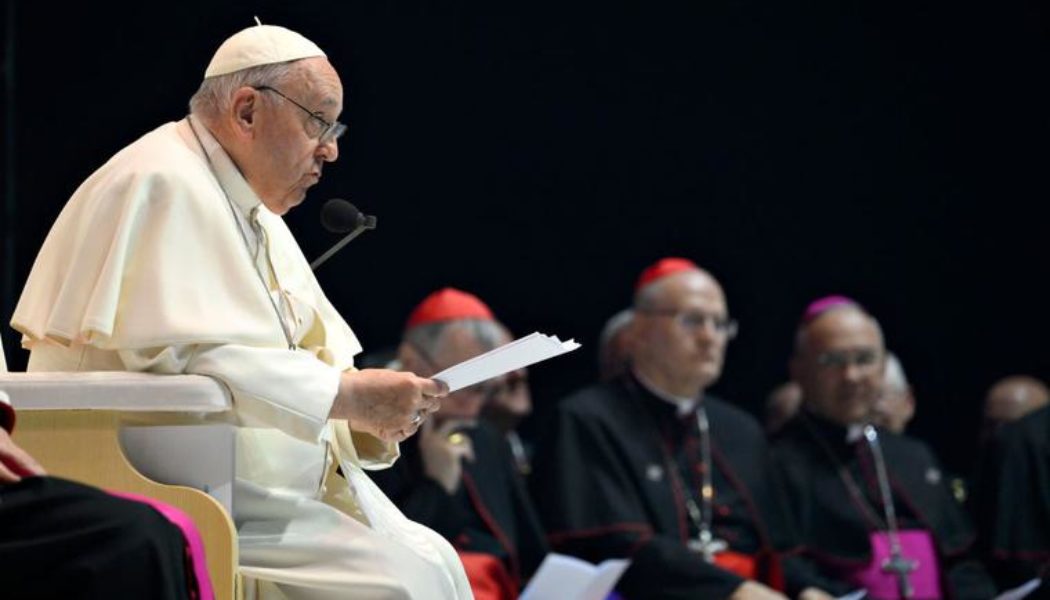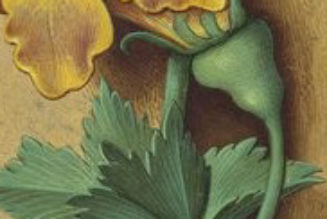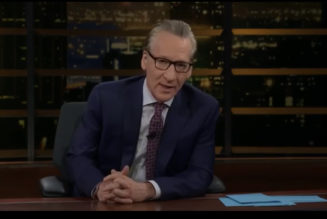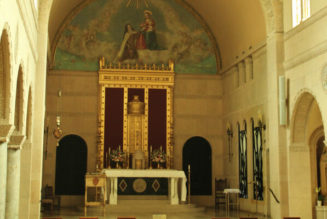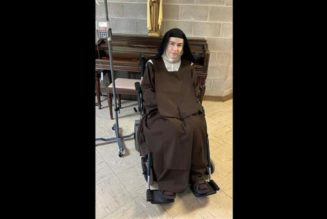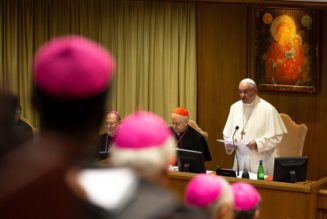
COMMENTARY: Like his holy predecessors, Pope Francis is inviting the Church to join him.
Pope Francis chose to let his 10th anniversary pass with no great ceremony and little public comment. Yet subsequently he seemed to be reflecting on his decade in the See of Peter and lamenting that his pontificate has become marked by growing divisions in the life of the Church. That was most evident in his recent apostolic visit to Hungary. It also formed what might be considered an examination of the papal conscience during Holy Week.
Something like a public examination of conscience can be part of significant papal anniversaries. On his 20th anniversary in 1998, St. John Paul II preached:
“After 20 years of service in the Chair of Peter, I cannot fail to ask myself a few questions today … Are you a diligent and watchful teacher of faith in the Church? Have you sought to bring the great work of the Second Vatican Council closer to the people of today? Have you tried to satisfy the expectations of believers within the Church, and that hunger for truth which is felt in the world outside the Church? … This is my duty, to do all I can so that when the Son of man comes, he will find faith on earth.”
In 1978, just weeks before his death, St. Paul VI marked his 15th anniversary of his election with an impassioned insistence that he had remained faithful to the deposit of the faith in a time of great turmoil:
“This [is] the Church’s faith, the apostolic faith. The teaching is preserved intact in the Church through the presence within her of the Holy Spirit, and through the special mission entrusted to Peter, for whom Christ prayed. … Such is the untiring, watchful and consuming purpose that has carried us forward during these 15 years of our pontificate. ‘I have kept the faith!’ we can say today, with the humble but firm consciousness of never having betrayed ‘the holy truth.’”
Blessed John Paul I’s early death and Pope Benedict XVI’s abdication meant that neither had significant anniversaries as pope.
Without making explicit reference to his 10th anniversary, Pope Francis used his Chrism Mass homily on Holy Thursday to speak about divisions in the Church. And he included himself in those who must ask if they are responsible for fomenting them.
“We sin against the Spirit who is communion whenever we become, even unintentionally, instruments of division,” the Holy Father said, including himself as a potential cause of division. “Let us ask ourselves: In my words, in my comments, in what I say and write, is there the seal of the Spirit or that of the world?”
Ironically, he gave an example of just that in that same homily, his own words causing injury and friction. He stated that “we priests are rude,” at least “more often than not.” More than a few priests would dispute that, to say nothing of a great many parishioners whose experience is altogether different.
Nevertheless, papal rhetoric is of lesser importance compared to serious divisions that have emerged in recent years — divisions over doctrine, liturgy and governance, all of which compromise communion.
In an address to clergy and religious in Hungary, Pope Francis had this blunt assessment to the spirit of ecclesial division that he had observed in recent years:
“It is sad when we become divided, because, instead of playing as a team, we start playing the game of the enemy: it is the Devil who divides. He is a master at it; it is his specialty. We see bishops not communicating with each other, priests in conflict with their bishop, older priests versus younger ones, diocesan priests versus religious, priests versus laity, Latins versus Greeks. Issues about Church life, and political and social problems, polarize us and we become entrenched along ideological lines.”
Read in light of the Chrism Mass homily, Pope Francis may be following the example of his saintly predecessors, Paul VI and John Paul II, examining his own conscience. To what extent has his pontificate been one of divisions?
Consider just five recent examples.
- The German “Synodal Way” has produced not only divisions with the German Church, but the largest breach within the universal episcopate in recent centuries. Both the Polish and Scandinavian bishops have denounced the Germans as having betrayed what St. Paul VI called the “holy truth.” The Holy Father, despite repeated attempts, has proved wholly unable to be a center of unity in the truth regarding Germany.
- The China policy of Pope Francis is now widely acknowledged to be in shambles, as the Chinese Communist Party has now created dioceses that the Vatican does not recognize, and appointed a new bishop in Shanghai without the Vatican’s knowledge, a bishop who himself is part of the state-approved Catholic “patriotic association.” This has exacerbated divisions in the Catholic Church in China, as the disputed status of their bishops fractures the already fragile communion of the local Church.
- Just this week, the senior bishops of the Syro-Malabar Church in India are in Rome, seeking a solution to their liturgical wars, which involve actual violent clashes during the Holy Mass. The Holy Father’s recent decrees have not brought harmony but escalation.
- Liturgy “wars” in other parts of the Church are metaphorical, not literally violent, but the Holy Father’s restrictions on the Traditional Latin Mass have unleashed both cold cruelty and hot rhetoric in many places where relative tranquility previously reigned.
- And at the highest levels of global Christian leadership, the full-scale invasion of Ukraine by Russia has brought a high level of division between senior Christian pastors. Pope Francis has directed withering rhetoric against Kirill, Russian Orthodox Patriarch of Moscow. Previous disputes about Ukraine already meant that communion had been broken in Orthodoxy between Moscow and Constantinople.
Clearly Pope Francis is not singularly responsible for these developments. But at 10 years, his pontificate has witnessed bitter divisions — from the various synods held in Rome to clashes in the political order. And like his holy predecessors, Pope Francis is inviting the Church to join him in an examination of conscience.
